 |
| |
Exclusive: MI6 recently caught up with James Bond
composer David Arnold to talk about his work on Casino
Royale.
|
|
In Conversation With David Arnold (2)
15th April 2007
Exclusive: MI6 recently caught up with James Bond composer David
Arnold to talk about his work on Casino Royale. In the second part
of this serialized interview, he talks about the use of the famous
James Bond theme.
 In
Conversation With David Arnold - Part 1
In
Conversation With David Arnold - Part 1
How did you feel when you first saw the script? Was
there a note in the script that said the James Bond theme
tune should be played at the very end?
I was kind of reading
it and hearing it as we went through. I thought the way
that the gun barrel was written originally
was slightly different to the one
we had in the script. But the idea that all of a sudden you where seeing
a real gun and seeing him react to it... I thought that
worked as a very neat
tie-in – a clever and glorious Bond moment. You got it in a different
way and again that is something that he’d earned now. He’d earned
the right to assassinate whoever was stalking him at the start of
every film.
As I was reading through the script what struck me about
it, which was very refreshing, was that the fact that people
had conversations in the film that lasted more than 10
seconds without something blowing up. Obviously it had
great dialog – sharp, witty, erudite, smart – and
great story structure. Dialog still felt funny where it
needed to and wasn’t forced and stupid, it didn’t
feel silly, it’s a more mature film in a lot of ways.
It’s still enjoyable, not as much outright fun as
the last film but it’s more satisfying in a lot of
ways. But you can enjoy James Bond films in many different
ways; you have many different people playing the part in
many ways. |
|
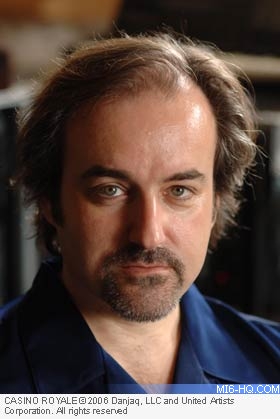
Above: Casino Royale is composer David Arnold's
fourth consecutive James Bond score. |
Reading through the script you realise that it is a far more
intriguing and consequential relationship that he has with Vesper
and realised that his relationship with Solange helps him get
where he wanted, and informed us a great deal about his attitude
to women. I think he would have had the same attitude with a
man.
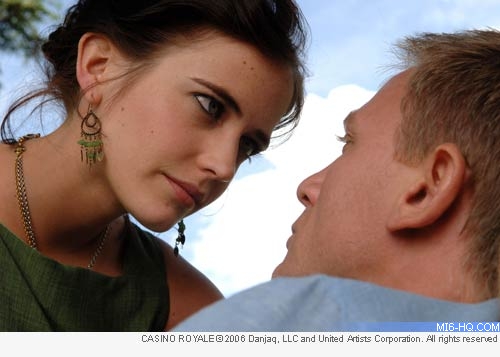 "I was relieved that we weren’t
jamming the film with action"
"I was relieved that we weren’t
jamming the film with action" |
"Die Another Day" was
almost 65 minutes of solid action music whereas I think Casino
Royale was 35 minutes.
When I said to people that I knew there’s only half as
much action in it as there was in “Die Another Day” people
thought that was odd. A lot of people desperately, desperately,
desperately want to have some kind of substance between the action
because that’s what kind of makes the action more exciting
and more involving and engaging. Because you’ve learnt
and know the people a bit more and you find out what their motivations
are. There was such a lot of it in “Casino Royale”.
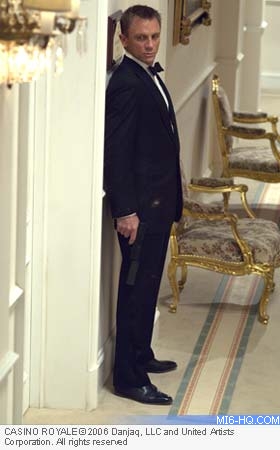 |
|
When we went to see “Dr No" at EON when they
had a 40th Anniversary screening a few years back it was
the first time I’d seen that projected for a long
time. I was amazed at how much talk there was. They discussed
things.
"When you have an actor of Daniel’s
calibre you enjoy watching it because he just makes the
film come
alive"
And I think they had a great cast: Judy was fantastic
and I thought Mads Mikkelsen was great. Eva was amazing
and just seemed to be perfect!
Even when we spotted the film, I was sitting watching
it go by and didn’t want them to switch it off – even
though it was the tenth time we had sat through it. We
talked about some ideas and where some things need to happen
and what they needed to do. I never wanted them to stop;
I just wanted to keep watching it. There probably wasn’t a day that went by when something
didn’t turn up in a newspaper or on a website – which
ups the stakes. Whether it was true or not, the kind of
consciousness was global and all encompassing.
|
Everyone knew that it was a risk because we weren’t sitting
on the comfortable film which we could have been sitting on.
That element of risk was felt from day one, but it felt like
we all jumped together and although I can only speak for myself.
We all knew that ‘this’ was the film that we wanted
to make and in a way it was sort of a film that we were waiting
to make for quite a while.
I was so pleased when it performed the way it performed and
was received the way it was received. It felt quite clear to
me that it was what we were doing from day one. I think it’s
quite difficult to see that people had no idea of what we were
doing and were publishing opinions and speculating on it: Daniel
not being able to drive a manual car – how ridiculous – what
nonsense. It is a worldwide thing, it always has been and in
a way it’s
always been the same I just think we’ve made a better film.
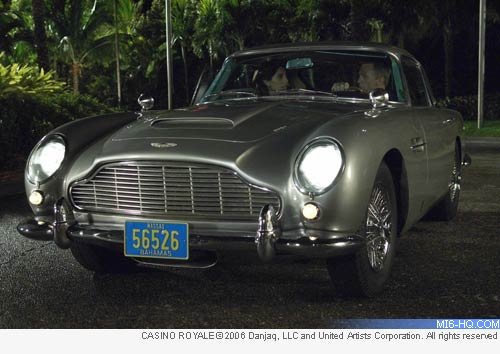 "Daniel not being able to drive
a manual car – how
ridiculous"
"Daniel not being able to drive
a manual car – how
ridiculous" |
You mentioned before that there are key moments when Bond receives
a little bit of the theme?
It seemed fairly obvious to me where
they were and it’s
interesting because a lot of this film is about the iconography – the
creation of the iconography. Talking with Daniel Kleinman about
the opening: he was kind of going for the origin of the silhouette
logo, how did we get there and what does that mean. It was the
iconography of the whole thing. It is like a celebration of the
icon even though everyone knows it and is familiar with it. Like
in the first “Star Trek” film, where they go to the
bay where the Enterprise is revealed for the first time you get
that little tingle even though you’ve seen it a hundred
times, there’s just something about seeing it again.
Similar to seeing James Bond get his Aston Martin for
the first time, rather than it be a matter of fact that
he has it. To see him make his first kill and see him suffer
the consequences of it internally, the consequences of
his
first kill in the bathroom. Absorbing the image that the
dinner jacket gives him – being completely and utterly
reluctant to have anything to do with it.
All of a sudden
it’s kind of clinging to him like a second skin.
To inhabit that world and all of a sudden be the person
he needs to be; to wear that dinner jacket to be at the
table to beat those people. You know I think that’s
very exciting! |
|
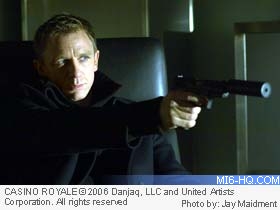 |
Even if you’re not a Bond fan you’ve got to be aware
of the character and I think that a lot of people who weren’t
necessarily hard-core Bond fans wanted to see this film.
Stay tuned to MI6 for more of the David
Arnold interview...
Biography
David Arnold composed, arranged and produced the score for Casino Royale, his
fourth James Bond film, following Tomorrow Never Dies, The World is Not Enough
and Die Another Day. As composer for Casino Royale, Arnold collaborated with
Chris Cornell to write the title song “You Know My Name.”
Hailed as one of the most successful young British
composers, Arnold began his film career making short films with
fellow enthusiast Danny Cannon, teaching himself to write, orchestrate
and compose the scores for their films. In 1993, he scored Cannon’s
feature film debut The Young Americans, combining lush orchestration
with Bjork’s vocals for the title song “Play Dead,” which
earned critical and commercial success. This led to the offer
to score Stargate, Roland Emmerich’s sci-fi film, which
enjoyed box-office success and earned Arnold his first BMI Award.
Winner of seven BMI Awards for his music for
Tomorrow Never Dies, The World is Not Enough, Die Another Day,
Stargate, Independence Day, Godzilla and 2 Fast 2 Furious, he
also won a Grammy for Independence Day and recently won the Royal
Television Society Award for the title music of the UK comedy
series “Little Britain.” In addition, he won the
Ivor Novello Award for the music for The World Is Not Enough.
He has been recognized by the film industry as a talented and
diverse composer, arranger and producer, whose scores include
Shaft, Changing Lanes, 2 Fast 2 Furious, The Stepford Wives and,
most recently, Michael Apted’s Amazing Grace, Venus directed
by Roger Michell, and Hot Fuzz directed by Edgar Wright.
Related Articles
 Casino
Royale Coverage
Casino
Royale Coverage
 Casino
Royale Official Soundtrack - Preview
Casino
Royale Official Soundtrack - Preview
 You
Know My Name - Single Preview
You
Know My Name - Single Preview
 Chris
Cornell On Casino Royale
Chris
Cornell On Casino Royale
 Bond
Music
Bond
Music
Many thanks to David Arnold. Check out his official website
- www.davidarnold.com